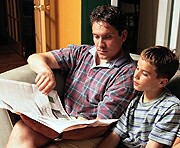
FRIDAY, Dec. 20, 2013 (HealthDay News) — Almost one in six fathers doesn’t live with his children, according to new research that looked at how involved dads are in their children’s lives.
“Men who live with [their] kids interact with them more. Just the proximity makes it easier,” said study author Jo Jones, a statistician and demographer with the U.S. National Centers for Health Statistics.
“But significant portions of fathers who are not coresidential play with their children, eat with them and more on a daily basis. There’s a segment of non-coresidential dads who participate very actively,” Jones said. “Then there are the coresidential dads who don’t participate as much, although that’s a much smaller percentage — only 1 or 2 percent. Living with children doesn’t necessarily mean a dad will be involved.”
Jones said other studies have shown that a father’s involvement helps children academically and behaviorally. “Children whose fathers are involved usually have better outcomes than children who don’t have dads in their lives,” she said.
The findings were published online Dec. 20 in a report from the U.S. Centers for Disease Control and Prevention.
The study included a nationally representative sample of more than 10,000 men between the ages of 15 and 44, about half of whom were fathers. The study included adopted, biological and stepchildren. The men were surveyed about their involvement with the children in their lives.
Seventy-three percent of the fathers lived with their children, while another 11 percent had children they lived with as well as some they didn’t live with. Sixteen percent of the fathers had children they didn’t live with at all, according to the study.
For children under the age of 5, 72 percent of dads living at home fed or ate meals with their child daily, compared to about 8 percent of dads who didn’t live with their young children, the study found. More older fathers, Hispanic fathers and dads with a high school education or less reported not having eaten a meal with their children in the past four weeks.
Ninety percent of fathers living with their young children bathed, diapered or dressed them, compared to 31 percent of dads who lived apart from their children. Older dads, Hispanic fathers and those with a high school diploma or less again were less likely to have participated in these activities, according to the study.
Dads who lived with young kids were six times more likely to read to them.
For children between the ages of 5 and 18, 66 percent of dads who lived with their children ate meals with them every day, compared to about 3 percent of fathers who didn’t live with their kids. Just 1.4 percent of dads living with older children reported not having eaten with their kids at all in the past four weeks, compared to 53 percent of the dads who didn’t live with the kids.
Hispanic fathers were more likely to eat meals with their older children daily than were white fathers — 71 percent versus 64 percent, according to the study.
Not surprisingly, fathers who lived with their kids were more likely to take them to activities than those who didn’t: 21 percent compared to 4 percent. Thirty percent of dads living with kids checked homework daily versus 6 percent of non-coresidential fathers. Black fathers were significantly more likely to help their children with homework every day than were white or Hispanic dads.
Fathers living at home also were more likely to talk to kids every day about things that happened during the day. However, 16 percent of non-coresidential fathers also reported talking to their kids every day.
“I think newer electronic devices, like cellphones, have made it much easier for dads who want to reach out and talk to their non-residential children,” Jones said.
How do dads think they’re doing? Most — whether they live at home or not — feel there’s room for improvement. Just 44 percent of fathers living with their kids felt they were doing a “very good job,” while only 21 percent of non-coresidential dads felt the same.
Dr. Victor Fornari, director of the division of child and adolescent psychiatry at the North Shore-LIJ Health System in New Hyde Park, N.Y., weighed in on the study’s findings.
“The recognition that so many youngsters are being raised with limited access to their fathers is sad,” Fornari said. “We have to be mindful of the differences fathers can make in the life of a child.”
“It seems that not being there is a sense of distress and frustration for the fathers,” he said. “But they need to know that the quality of parenting matters whether you live there or not.”
“What’s critically important if you don’t live with your children, however, is that you find a way to get along with the other parent,” Fornari said. “Parents working together — even if they’re not a couple — provide a balance. You need to work effectively together for your children. Try to be as involved as possible with your kids and work collaboratively with [their] mom to minimize conflicts and work in the best interest of your kids.”
“Fathers do matter. You can have a profound impact on your child’s life, even if you’re not living with them,” Fornari said. “If you are living with them, be sure that you’re actively engaged. Just being present isn’t enough. Make sure you have dinner with your kids. I understand people have busy schedules, but if you don’t have time for dinner together most nights, when do you have time to interact?”
More information
Learn more about the importance of fathers from ChildWelfare.gov.
Copyright © 2026 HealthDay. All rights reserved.

